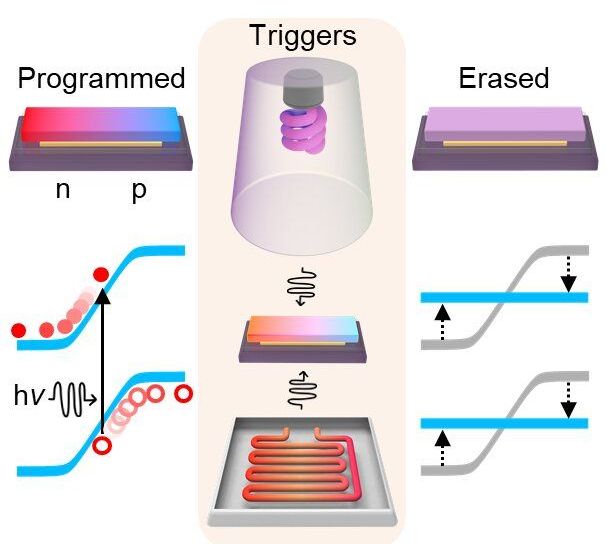
Get the latest international news and world events from around the world.


The first demonstration of phase-matching between an electron wave and a light wave
While researchers have conducted countless studies exploring the interaction between light waves and bound electron systems, the quantum interactions between free electrons and light have only recently become a topic of interest within the physics community. The observation of free electron-light interactions was facilitated by the discovery of a technique known as photon-induced near-field electron microscopy (PINEM).
Although some experiments using PINEM methods have yielded interesting results, the free-electron light interactions observed so far are fairly weak. This is mainly because PINEM methods gather localized and near-field measurements without addressing the velocity mismatch between free electrons and light, which is known to limit the strength of their interaction.
Researchers at Technion–Israel Institute of Technology have recently observed a strong interaction between free electron waves and light waves, using a hybrid electron microscope they developed. Their observation of coherent electron phase matching, which is also a type of inverse-Cherenkov interaction, demonstrates how the nature of electron wavefunctions can alter electron-light interactions.

Day-Trade Market Clustering with Transdimensional Machine Learning
The enthusiastic developer of the “GitHub AI Brain-of-Brains” and “GITHUB2VEC” NLP productivity tools. A passionate multi-discipline Aerospace Mechanical Engineer with extensive experience integrating Artificial Intelligence, Hybrid Reinforcement Machine Learning (Hybrid-NEAT), data science and multi-discipline based simulation in Hybrid Reinforcement Learning based Optimization (Hybrid-NEAT), design and analysis of complex air, space and ground-based systems and engineering tool development.

Why Children Need To Learn About Artificial Intelligence
It has been really fun talking to the kids about AI. Should we help AI consciousness to emerge — or should we try to prevent it? Can you design a kindest AI? Can we use AI as an universal emotion translator? How to search for an AI civilization? And many many other questions that you can discuss with kids.
Ultimately, early introduction of AI is not limited to formal instruction. Just contemplating future scenarios of AI evolution provides plentiful material for engaging students with the subject. A survey on the future of AI, administered by the Future of Life Institute, is a great starting point for such discussions. Social studies classes, as well as school debate and philosophy clubs, could also launch a dialogue on AI ethics – an AI nurse selecting a medicine, an AI judge deciding on a criminal case, or an AI driverless car switching lanes to avoid collision.
Demystifying AI for our children in all its complexity while providing them with an early insight into its promises and perils will make them confident in their ability to understand and control this incredible technology, as it is bound to develop rapidly within their lifetimes.

Programmable electronics based on the reversible doping of 2-D semiconductors
In recent years, researchers have been trying to develop new types of highly performing electronic devices. As silicon-based devices are approaching their maximum performance, they have recently started exploring the potential of fabricating electronics using alternative superconductors.
Two-dimensional (2-D) semiconductors, such as graphene or tungsten diselenide (WSe2), are particularly promising for the development of electronics. Unfortunately, however, controlling the electronic properties of these materials can be very challenging, due to the limited amount of space within their lattices to incorporate impurity dopants (a process that is critical for controlling the carrier type and electronic properties of semiconductor materials).
Researchers at University of California, Los Angeles, have recently devised an approach that could enable the development of programmable devices made of 2-D semiconductors. This approach, presented in a paper published in Nature Electronics, leverages a superionic phase transition in silver iodide to tailor the carrier type within devices made of WSe2 via a process called switchable ionic doping.
A cosmic amethyst in a dying star
On Earth, amethysts can form when gas bubbles in lava cool under the right conditions. In space, a dying star with a mass similar to the Sun is capable of producing a structure on par with the appeal of these beautiful gems.
As stars like the Sun run through their fuel, they cast off their outer layers and the core of the star shrinks. Using NASA’s Chandra X-ray Observatory, astronomers have found a bubble of ultra-hot gas at the center of one of these expiring stars, a planetary nebula in our galaxy called IC 4593. At a distance of about 7,800 light years from Earth, IC 4593 is the most distant planetary nebula yet detected with Chandra.
This new image of IC 4593 has X-rays from Chandra in purple, invoking similarities to amethysts found in geodes around the globe. The bubble detected by Chandra is from gas that has been heated to over a million degrees. These high temperatures were likely generated by material that blew away from the shrunken core of the star and crashed into gas that had previously been ejected by the star.

The technology that’s saving businesses millions of dollars
The Internet of Things can create tiny efficiencies that amount to a lot of money. Ben Fahy reports on how the IoT is changing the way businesses work.
Back in the 1830s, a depressed minister from Massachusetts named Lorenzo Langstroth got into beekeeping as therapy. His hobby eventually led him to develop the moveable comb hive, an innovation that allowed honey to be harvested without destroying the colony of bees. Since then, the art of beekeeping hasn’t changed much, but Bruce Trevarthen, the founder and CEO of the LayerX group, thinks some smart technology and a bit of connectivity might be the next big bee-based breakthrough.
ModuSense, a division of the Hamilton-based tech company/incubator, focuses on providing industrial Internet of Things (IoT) solutions, particularly for the primary sector. But when it kicked off around four years ago, Trevarthen felt that target was still too broad, so he decided to focus on improving the productivity of one sector in particular: apiculture.

Why is Mars so important for humanity?
It’s touchdown again on Mars, thanks to NASA’s InSight probe. This latest mission will continue our exploration of much that is still unknown about the planet.
As seen from Earth, the big red dot in the night sky has certainly caught the attention of humans since we started contemplating the universe.
The first observations with telescopes gave us a much clearer picture of Mars, with the poles covered in ice and different tones of red and black in the tropics.

MIT material can keep perishable goods cool without requiring power
MIT researchers have developed a new material inspired by camel fur made from two layers that can keep perishable goods cool without needing any power. The two-layer passive cooling system is made of hydrogel and aerogel. Researchers say that it can be used to keep foods or pharmaceutical cool for days without needing electricity.
The material can be seen in the photo above, its top layer is aerogel, and the bottom layer is a hydrogel. Material is inspired by camel fur, which helps keep the animals cool and helps them to conserve water in the scorching desert environment. It seems counterintuitive that a thick coat of fur would help camels to stay cool, but tests have shown that a shaved camel loses 50 percent more moisture than an unshaved one under ideal conditions.
The bottom layer of MIT’s material is a substitute for sweat glands made of hydrogel. This gelatin-like substance is mostly water contained in a sponge-like matrix that allows the water to evaporate easily. The upper aerogel layer plays the part of the fur, keeping out external heat while allowing the vapor to pass through. Hydrogels have been used for cooling applications in the past. Field tests have found that MIT’s material can provide cooling of more than seven degrees Celsius for five times longer than hydrogel alone despite being less than half an inch thick.